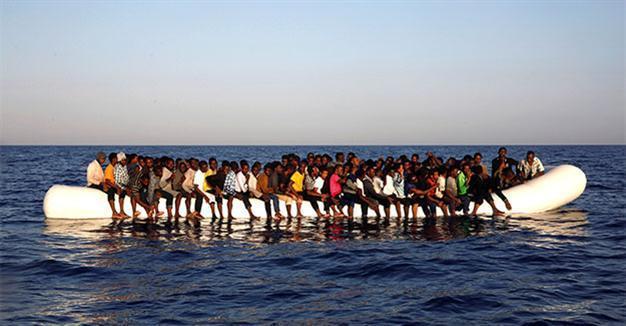Migrant deaths in Mediterranean rise by 37 pct in 2016’s first half
BERLIN

A dinghy overcrowded by African migrants is seen drifting off the Libyan coast in Mediterranean Sea August 20, 2016. REUTERS photo
Migrants dying or disappearing while attempting to cross the Mediterranean increased by 37 percent in the first half of 2016, when compared to the same period a year prior.The International Organization for Migration’s Global Migration Data Analysis Center in Berlin said 2,901 people died or disappeared while crossing the Mediterranean in the first six months of 2016, a 37 percent increase over the first six months of last year, the Associated Press reported.
Most of the deaths, 2,484, occurred on the so-called Central Mediterranean route from North Africa to Italy, where some 70,000 people crossed in the first half of 2016.
“The numbers have not increased hugely in terms of those crossing, but the risk of death remains high and is increasing,” said Frank Laczko, head of the Berlin center.
The Central Mediterranean route has always been the most dangerous route because of the length of the journey, while smugglers continue to overfill unseaworthy vessels with desperate migrants.
Adding to the problem now, however, are more frequent instances where smugglers are sending multiple boats at once, making rescue operations more difficult. In addition, newer routes, particularly from Egypt, are longer and riskier, and search and rescue efforts are often carried out farther away from land.
“Smugglers are showing absolutely no interest in the welfare of the people who are paying for their services, and cramming unseaworthy vessels with more and more people to increase profits,” Laczko said.
He added that further study needed to be done to determine whether other factors in the rising death toll may be at play, like whether the overland journey to the coast has become so grueling that migrants undertake the Mediterranean crossing already undernourished and exhausted.
The number of deaths in the Central Mediterranean peaked in May at 1,130, and dropped to 388 in June, 208 in July and only 29 so far in August, but Laczko said it’s too early to tell whether this may be part of a trend.
In the Eastern Mediterranean, however, few deaths have been reported since a March deal between the EU and Turkey, combined with Balkan border closures to migrants, has led to a dramatic drop in new arrivals.
Where some 885,000 migrants crossed from Turkey to Greece along the route in 2015, the IOM reported that new arrivals are down 98 percent since the March 20 agreement. Some 154,000 arrived in Greece in the first half of the year, but almost all in the first three months.
A total of 376 deaths were recorded in the Eastern Mediterranean in the first six months of 2016, but there were only 10 in April and none in May or June, according to the report.
Laczko said there were no indications that the EU-Turkey agreement has been forcing people to attempt the more perilous Central Mediterranean crossing, though in recent days there have been reports of some trying to make it to Italy from Egypt.
Merkel calls on N African states for migrant deal
Meanwhile, German Chancellor Angela Merkel on Aug. 22 called on the EU and North African countries to make deals modelled on the controversial agreement with Turkey to stem migrant flows to Europe.
Under the EU-Turkey agreement, Ankara agreed to take back one Syrian who made it to Greece in return for being allowed to send one from its massive refugee camps to the bloc in a more orderly redistribution program.
The deal also pledged billions of euros in EU aid for Turkey, visa-free European travel for Turkish citizens and accelerated EU membership talks.
“We must agree on similar deals with other countries, such as in North Africa, in order to get better control over the Mediterranean Sea refugee routes,” Merkel told regional daily Neue Passauer Zeitung, according to AFP.
“Such agreements are also in the interest of the refugees themselves,” she said, pointing to the huge risks migrants take in crossing the Mediterranean in rickety vessels, as well as the large sums they have to pay smugglers for the perilous sea passage.
















